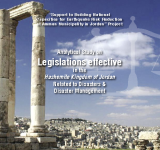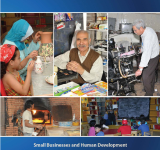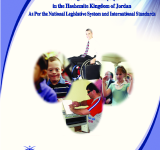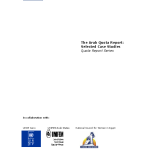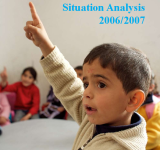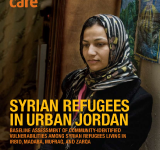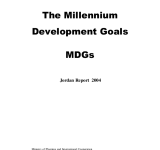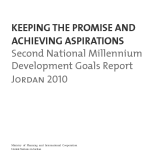This study is an analytical study of the legislations effective in the Hashemite Kingdom of Jordan related to disasters and disasters management. It provides an overview of the disasters;; their types and management as well as an analysis of effective legislation related to disaster management in Jordan. The report concludes that To achieve consistency and integration among all ministries and public and private institutions concerned with facing disasters in all stages;; and to achieve the optimal use of available capabilities and resources as well as preventing duplication and overlapping which waste energies and in order to achieve the aforementioned disaster management principles;; there should be a certain authority responsible for disaster management in all its stages.
environment
This report explores the role of Small and Medium-Enterprises (SME);; as an agent for sustainable human development in Jordan. It analyzes SMEs and their contribution to human development using fours key central pillars of human development;; namely: economic growth that is equitable and pro-poor;; social progress;; participation and empowerment through micro finance;; and environmental sustainability. The report analyses the link between SMEs and empowerment or lack thereof;; with a specific focus on the two issues of employment;; as a tool for empowerment;; and the capacity of SMEs to enhance the position of women within the workforce and home. The report findings were based on extensive research;; a survey of 1;;500 firms and focus groups discussions conducted across the governorates of Jordan. The report proposed general recommendations in terms of institutional coordination;; exports;; cluster groups;; quality standard;; government monitoring;; tax law;; local development;; youth empowerment and the increase of minimum wage.
This study aims to demonstrate the rights of disabled people stated by the legislator. The study shows the extent to which state and civil society institutions adhere to the implementation of applicable legislations related to people with disabilities.
This report was compiled from the findings and case studies presented at a workshop held on 5-6 December 2004;; in Cairo Egypt. This report contains an overview on global trends and regional analyses;; implementing legislated quotas for women;; quota adopted by political parties;; methods on enhance women’s participation;; and the role of the international community and international instruments. The international IDEA had convened a series of regional workshops to gather qualitative data. The report also has 6 case studies about women’s participation and quota include comparative experiences with quotas;; address the culture challenges to women’s representation in the Arab world;; and point the opportunities that could be seized in order to meet those challenges.
يهدف هذا التقرير الى تحليل الانجازات التي تحققت للأطفال في الأردن. ويتضمن التقرير معلومات وإحصاءات عن صحة الأطفال والتعليم والمشاركة بالإضافة إلى حماية الطفل. ويشير أيضا الى ما يجب القيام به ويبين ما هي الفجوات. وكان أبرز ما خلص إليه التقرير أن الصحة العامة والصحة الإنجابية ليست موجهة بشكل كاف لاحتياجات المراهقين;; وكما أن التوعية الصحية متدنية بين الفتيات والذكور;; اضافة الى محدودية فرص الحصول على المعلومات والتثقيف حول نمط الحياة الصحي. وأن خدمات رعاية الطفولة تتويسع ببطء مع زيادة الوعي. والاشارة الى نسبة التسرب وعمالة الاطفال;; وشعور الشباب والنساء بخيارات المشاركة المتاحة. وبين التقرير أنه لأطفال اللاجئين الفلسطينيين الحق في الوصول إلى كافة الخدمات. واعتبار أن الفقر وسوء الأحوال الصحية ونقص التعليم;; جميعها عوامل تحرم الأطفال من كرامتهم;; وتهدد حياتهم وتقضي على آمالهم. وكما يقدم التقرير توصيات بشأن ما يجب القيام به لزيادة تحسين حالة الأطفال في الأردن.
This report is a baseline assessment of community-identified vulnerabilities among Syrian refugees living in Amman;; Irbid;; Madaba;; Mufraq;; and Zarqa. The purpose of this report is to identify urban Syrian refugees’ current coping mechanisms and any gaps in services available to Syrian refugees in Jordan. The research methodology is both qualitative and participatory in design;; drawing from the UNHCR tool for Participatory Assessment in Operations. This report presents only the data from household interviews;; baseline assessment;; and the follow-up focus groups conducted with community members. The number of households surveyed was 240;; with a total number of 1;;476 household members and 89 focus group participants representing 534 household members. The report proposed general recommendations and interventions to deal with the main highlighted challenges (cash assistance;; strengthening community links;; vocational training;; physical activities ...etc).
The Millenium Development Goals Report has been prepared through the active participation of the Jordanian Government and the UN Country Team. As scorekeeper of the MDGs;; UNDP supported the Ministry of Planning and International Cooperation in this joint endeavor. The objectives of this report are to create a baseline situation;; monitor progresses made to date;; and indicate what should be done in order to achieve the MDGs. The concluding section of fostering global cooperation gives an overview of national efforts to strengthen the basis and improve the environment for developing strong partnerships to achieve macroeconomic stability and other important national objectives.
Jordan’s second Millennium Development Goals Report 2010 shows the extent to which progress has been made towards achieving those targets and highlights the challenges that still confront the country to achieve these goals. The report seeks to identify the policies required for meeting the MDG targets by the year 2015;; at a time when the United Nations and the World’s governments are exerting a collective effort to review the progress achieved to date and identify the obstacles standing in the way of meeting the goals and targets by 2015.
